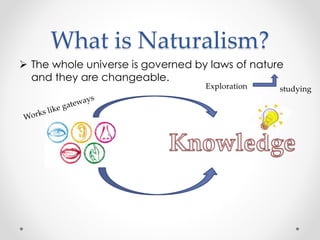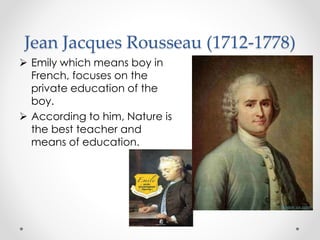Naturalism2
- 1. NaturalismPerspective of Philosophy of Education (Western Schools) Lera Mae G. Latras Reporter
- 2. What is Naturalism? Naturalism is a concept that firmly believes that ultimate reality lies in the nature of matter. (Maheshwari,2011) Made up supreme
- 3. What is Naturalism? The whole universe is governed by laws of nature and they are changeable. Exploration studying
- 4. What is Naturalism? An educational theory that is applied to systems of training that are not dependent on schools and books but on the manipulation of the actual life of the educand.
- 5. Definition of Naturalism Naturalism is opposed to idealism, subordinates mind to matter and holds that ultimate reality is material world, not spiritual world. Naturalism is a doctrine which separates nature from God, subordinates spirit to matter and sets up unchangeable lows as supreme. Naturalism is philosophical position adopted by those who approach philosophy form purely scientific point of view.
- 6. Jean Jacques Rousseau (1712-1778) One of the famous nature philosopher on the 18th century published his famous book “Emile” which contained Rousseau’s ideas on naturalism.
- 7. Jean Jacques Rousseau (1712-1778) Emily which means boy in French, focuses on the private education of the boy. According to him, Nature is the best teacher and means of education.
- 8. Jean Jacques Rousseau (1712-1778) Rousseau considered world as an artificial, autocratic, egotistic and arrogant place and Rousseau believed that education should be given according to the natural interest of the child aiming at a holistic development of the personality .
- 9. Theoretical Rationale of Naturalism “Naturalism is the doctrine which separates nature from God, subordinates spirit to matter and sets up unchangeable laws as supreme”
- 10. Metaphysical Position Concept of God The Concept of Self The human self is seen by naturalism as an offshoot of Nature, and not as springing from beyond Nature Man is the child of Nature Naturalist God is within Nature
- 11. Epistemological Position of Naturalism observation accumulation generalization Scientific knowledge: Empirical and experimental knowledge Sensory training
- 12. The Logic of Naturalism • Simple induction o Involves careful observation of Nature, accurate description of what is observed, and caution in formulating generalization
- 13. Axiological Position of Naturalism • Naturalism believes that: o nature is versatile. o Instincts o Drives o Impulses o There is no absolute good or evil in the world. Values of life are created through human needs. Need to be expressed rather than repressed
- 14. Values 1. Ethical Value 2. Aesthetic Value 3. Religious Value 4. Social Value
- 15. Naturalism in Education “We are born weak, we need strength; helpless, we need aid; foolish, we need reason. All that we lack at birth, all that we need when we come to man’s estate, is the gift education”-Jean Jacques Rousseau
- 16. Naturalism in Education Naturalism as a philosophy was developed in the 18th century. Based on the assumption that nature represents the wholeness of reality Education must conform to the natural processes of growth and mental development Education should be pleasurable.
- 17. Naturalism in Education Education should be pleasurable Education should engage the spontaneous self- activity of the child.
- 18. Aims and objectives of Education “Complete living” is the general aim. This impression borne out by the following objectives: 1. Self Expression 2. To prepare Man for the struggle 3. To enable him to adjust himself with his environment 4. Natural Development
- 19. 5. Development of Culture 6. To perfect human machine 7. Attainment of present and Future happiness 8. Autonomous development of personality 9. Redirection of human instincts 10.Proper utilization of leisure time
- 20. The Concept of Teacher “Teacher in a naturalistic set up is only a setter of the stage, a supplier of materials and opportunities, a provider of an ideal environment, a creator of conditions under which natural development takes place.”-Ross
- 21. The Concept of Teacher 1. Teacher as a Guide 2. Teacher as a Observes 3. Teacher as a protectors 4. Teacher as an Organize
- 22. The Concept of Student “Everything is good as it comes from the hands of the author of nature. Man meddles with them and they become evil”- Rousseau
- 23. The pupil is to the teacher what man is to the philosopher Know the child and you will know what to teaches Naturalist advised to include the following in the curriculum Science help children acquainted with nature Mathematics and language Help acquire the subject of science History and Social Science Help realize the importance of those in their present life Agriculture and Carpentry Help them act in freedom Will increase their power of observation Drawing Considered as the main technique of self expression Physical Education and Health Training For self protection
- 24. Methodology of Instruction 1. Learning by Doing 2. Learning by playing 3. Learning by direct experience 4. Activity Method 5. Freedom in the child 6. Negative Method
- 25. Concept of Discipline Punishment should be constituted by natural consequences of wrong deeds; should be certain, but tempered with sympathy.
- 26. Concept of Discipline Aims at making education free from the bondage of rigid discipline under which children were tortured. Naturalism advocates maximum freedom from the child and the freedom of the child disciplines him and he is naturally controlled by his own learning and experiences
- 27. Women Education A girl cannot be educated to be a man According to Rousseau, “ a woman should be the centre of the family, a housewife, and a mother. She should strive to please her husband, concern herself more than he with having a good reputation, and be satisfied with a simple religion of the emotions.”
- 28. Agencies of Education 1. Home Rousseau recognize only the home. The foundations of good physical and mental health are laid during infancy. If the child is spoiled by faulty home training during these formative years, this tutor will have a great difficulty in correcting the errors 2. Church 3. School
- 29. Limitations of Naturalism in Education 1. Aims of Ideals of education are not exalting 2. Emphasis on present 3. Less emphases on books 4. All the emphases is given to scientific subjects 5. Unlimited Freedom given to the child 6. Unappealing principle of discipline by Natural Consequences 7. Teacher only in the background 8. Ignorance of society.
- 30. “From the solemn gloom Of the temple children Run out to sit in the dust, God watches them play and forgets the priest” -Rabindranath Tagore
Editor's Notes
- #3: Matter is considered to be supreme and mind is the functioning of the brain that is made up of matter.
- #4: It’s through our sense that we are able to get knowledge. The senses work like real gateways of knowledge. Exploration is the method that helps in studying nature
- #12: Naturalism highlights the value of scientific knowledge, through specific observation, accumulation and generalization. It also lays emphasis on the empirical and experimental knowledge. Naturalism also lay stress on sensory training as senses are the gateways to learning































